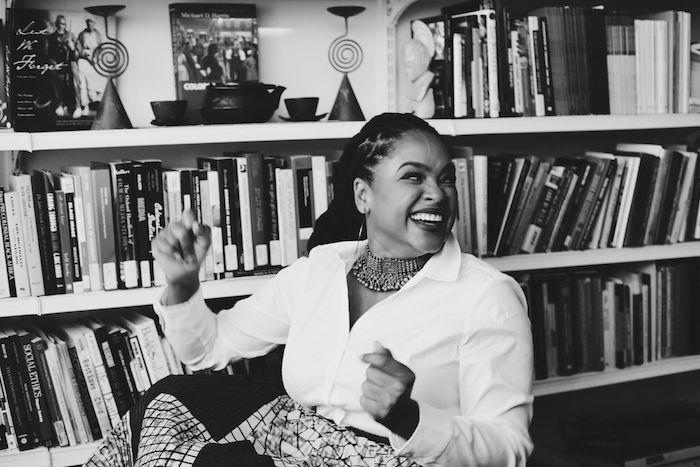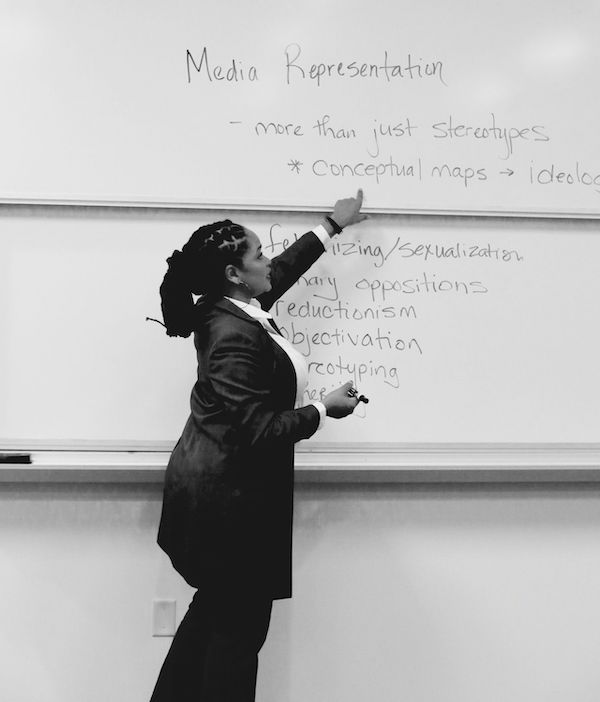Pioneering Scholarship for Social Transformation
By CSLR | Emory Law | Nov 9, 2020 12:11:00 AM

CSLR Alumna Dr. Roslyn Satchel Reflects on Critical Engagement with the Real World and Real People
This interview is part of a new series of discussions with distinguished CSLR alumni working at the intersections of law and religion in academic, legal, and religious professions
Dr. Roslyn Satchel is a distinguished CSLR alumna whose work exemplifies rigorous interdisciplinary scholarship at the intersections of law and religion
Since graduating from Emory with joint degrees in law and theology, Dr. Satchel has, among other things, served as the executive director for the National Center for Human Rights Education, published the highly-acclaimed book, What Movies Teach About Race: Exceptionalism, Erasure, & Entitlement (2016), and won this year’s Howard A. White teaching award in her current role as the Blanche E. Seaver Professor of Communication at Pepperdine University. Satchel advocates for racial justice as a member of Black Lives Matter-Los Angeles. She is an Itinerant Elder in the African Methodist Episcopal Church. At the epicenter of these diverse endeavors is the person of Dr. Satchel herself, who engages her critical expertise in media, religion, and law with activism to enact social change.
Dr. Satchel’s commitment to both rigorous scholarship and social change manifests itself in research about real world issues that concern real people. Her most recent publication, “Social Movements, Media and Discourse: Using Social Media to Challenge Racist Policing Practices and Mainstream Media Representation,” appears as a chapter in The Rhetoric of Social Movements: Networks, Power, and New Media (2020).
“Already as a student in our Center Roslyn Satchel made bold and prescient contributions to a better understanding of law, religion, and racial justice both at home and abroad,” CSLR Director John Witte, Jr. says. “It’s wonderful to see her marvelous work on these themes continue to expand to the edification of us all.”
In the following conversation, Dr. Satchel makes the case for why academia should pay closer attention to the everyday lives of people in their societies, finds precedent in history for the upheaval of our current political moment, and explains why she believes that education has the power to transform the world.
You are a scholar, activist, mother, church elder, and more. What do you think is the glue that holds all of these different identities and roles together?
My faith is the glue that holds together and inspires my best as a scholar, activist, mother, church elder, and more. Irrespective of context, my understanding of God’s call requires I show up fully to the best of my abilities each day.
I like to say that I met Jesus on my mother’s knee and then my father fortified that “knowing” with the Christian bible and the Black freedom struggle. Finally, I fertilized it all with global panAfricanism, anti-apartheid work, and human rights law. The result is my faith, which is pluralistic, critical, engaging, and Christian in the traditions of my ancestors and elders.
At its core, several diasporic African cultures, the Free African Society, and the African Methodist Episcopal Church inform my faith. Among our precepts, my faith tradition promotes education as a tool for economic empowerment, political liberation, and social justice. This enables people to deal critically and creatively with reality.
Through education, I believe, we discover how to participate in transforming our world. As facilitator and guide (my pedagogy), my first goal is to create an atmosphere whereby all students, regardless of prior education or privilege, develop a social justice framework for approaching topics. My second goal is to help students understand and critically apply these concepts to diverse texts and populations. Third, rather than focusing on multicultural awareness (which typically produces only a superficial understanding and concern), I emphasize the development of what Paulo Freire refers to as “Concientización,” or the development of a critical awareness of how personal dynamics unfold within social, historical, and political contexts. This tends to lead to changes that reflect a fundamental break with discordant practices and a new knowledge base and critical approach that places individuals/groups within a larger context that considers the influence of history, power, access, identity, and ability.
Who are some of the people who have been most formative in your life and career?
Most of all, my family has been formative in my life and career. I come from a large, Southern, connected, diverse, and vibrant extended family with whom I maintain proximity and close relationships. By doing so, I am aware of and involved in the issues that affect average, hard-working folks in my community. Ordinary folks doing extraordinary things inspire me not only to see the systemic changes needed to ensure human dignity and rights for all, but also to study the organic modes and means by which oppressed people thrive. We could learn a lot if we listened and learned with the people most affected by the policies that animate their lives.
Teresa Fry Brown, John Witte, Abdullahi An-Na’im, Alton Pollard, and Lynell Cadray were my most influential mentors while I was a student in the CSLR at Emory. Their work inspired me to study the most influential texts for their cultural impacts on society while also illuminating the content creator’s cultural influences for examination. That’s the driving force behind the scholarship and advocacy that I produce, and what led folks like the late Honorable John Lewis and Rev. C. T. Vivian to take me under their wings. In fact, Rev. Vivian hired me as the Executive Director at the National Center for Human Rights Education because he and Loretta Ross appreciated the ways I brought human rights and moral/ethical imperatives into my advocacy and policy briefs, especially in relation to law and religion.

Dr. Satchel identifies her faith practice as the unifying force behind her work.
You have earned degrees from Howard, Emory, and Louisiana State University, and you now serve as the Blanche E. Seaver Professor of Communication at Pepperdine University. How did your joint JD/MDiv from Emory fit into your career path, and how does it factor into your current scholarship?
In general, my scholarship examines the ideological implications of legal, media, and religious discourse with a particular interest in issues of race, gender, class, ability, age, ethnicity, status, sexual orientation, and religious affiliation. My JD and MDiv from Emory availed me of countless professional opportunities, but more important were the critical thinking and research skills, questions, concepts, epistemologies, laws, and ethics learned during my experience as a CSLR student. From “Feminist Legal Theory and Domestic Violence in the Christian Church” to “Religion, Race, & the Fourth Estate: Xenophobia in the Media Ten Years After 9/11,” my publications and presentations stimulate debate by scrutinizing the cultural influences of and on legal, media, and religious texts. My CSLR education remains integral each day in my work.
You’ve written numerous articles and a highly acclaimed book, What Movies Teach about Race: Exceptionalism, Erasure, and Entitlement. Do you have a favorite writing? If so, why is it your favorite?
I do not have a favorite writing. I am very critical of my work. My book, articles, and creative work are interrelated one to the other on some level. Even as I read my words, I can see the interconnectedness of the ideas, times, storylines, and narratives. All of it goes back to my ancestors. History influences, guides, and inspires me to write and offer hope as building blocks of truth for everyday people to read and use to empower themselves on their personal journey to their own truth.
Your scholarship bridges the fields of film, law, religion, ethics, critical race studies, and more. How do you understand the connections and navigate the tensions between these disciplines and topics?
As an interdisciplinary scholar, I want my work to bridge topics that cannot be bifurcated into the compartments of disciplines. Often, our best intentions to distinguish and specialize academically leave huge gaps when issues of social justice arise. My concern is for the lived realities of everyday people -- not so much academic tensions.
Similar to what I do as a strategic communication consultant, my law and religion skills enable me to address the structural barriers that restrict access to systemic equity and wellness for historically underserved or underrepresented communities and individuals in theory and praxis. For example, when working with religious denominations in Mississippi and Alabama to prevent clergy sexual misconduct, I designed an ethics educational program through which clergy and laity earned certifications that significantly reduced the incidences of sexual harassment and abuse by church leaders. Similarly, in Georgia, I worked with judges, lawyers, and treatment providers to address child sex trafficking, ensure compliance with best practices, and develop rehabilitative alternatives to detention. At Pepperdine, I have worked with the undergraduate college, the law school, and the Graduate School of Education and Psychology to help faculty, students, and staff with issues of diversity, inclusion, and an increased capacity for valuing difference in curricula and pedagogy.
Now, at Harvard, I am focusing on the stories of Black women intimate partner survivors regarding their need for extra-judicial, non-police, community-based alternatives to 911.
We are living through turbulent times – a global pandemic, movements for racial justice, deep political divisions, religious conflicts, and more. As someone who studies media and communications, what stands out about this moment in history when you look at the world around you?
Prior to entering academia, I was a policy advocate who pioneered using citizen journalism and social media for community organizing. My work influenced several state, national, and international policy changes and grassroots initiatives—for which I received several awards and significant national media coverage. I worked with advocates in countries including Italy, Kenya, Thailand, Ghana, India, and South Africa in human rights, interfaith coalition building, child advocacy, and indigent defense. Today, what stands out about this moment in history is that it is like so many other moments about which we read. Poor people are dying, and the most powerful and wealthy continue to resist structural, policy, and social change due to self interest.
Rev. James Lawson, a chief architect behind the 1960s civil rights actions in the South, said that our movement today for social justice has been extremely successful in expanding the reach of the Black Freedom Struggle beyond just constitutional rights. We discussed how requiring human rights in our domestic context must be our goal in relation to my article, A Requiem in Memoriam Our Great Ancestors, published July 23, 2020 by the Los Angeles Sentinel. In that piece, I had the privilege to reflect on the contributions of Congressman Lewis and Rev. Vivian for me personally and for the movement for Black Lives in particular. Their legacies influenced not only my life but also the lives of all who continue in the modern movements for justice and against white supremacy.
What advice would you give to someone who wants to follow in your footsteps?
My parents gave the best advice:
- “Pick and choose your battles wisely”
- “Haste makes waste”
- “Plan your work, and work your plan”
- “Always be prepared. If you stay ready, then you won’t have to get ready.”
- “Trust in the Lord with all your heart…” (Proverbs 3:5-6)
I add, simply, “Do what you love with people you like.” This applies professionally and personally. I love writing. I love teaching. I love doing research. I love working in collaboration and community with regular folk. I enjoy developing educational resources and media literacy opportunities in academic, church, and community settings that engage human rights in practical questions of race, gender, beliefs, class, ability, sexual orientation, language, ethnicity, age, education, immigration status, and cognitive/emotional difference.
When you love your work like I do, the exhilaration and fulfillment are greater than any monetary compensation. Have fun!

